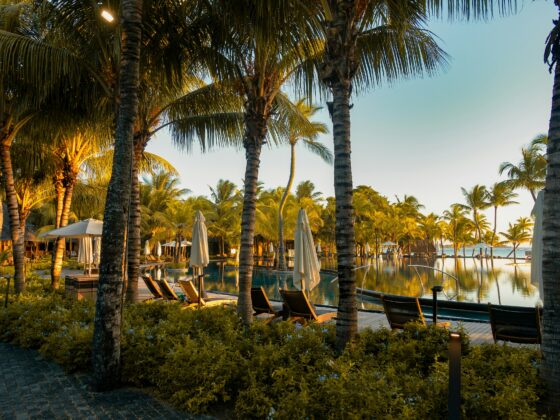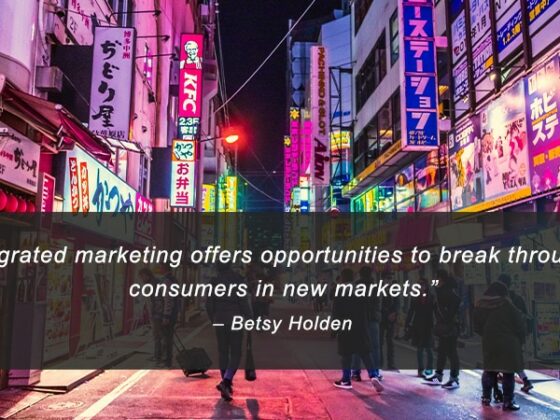Josiah: Could you tell us a little bit about how you got started with Expedia?
Melissa: Sure, absolutely. So I actually went to college for hospitality management in Las Vegas, as an undergrad and graduate student. And right out of college, I joined the Las Vegas Hilton, and Expedia was actually my client. And about, gosh, about a year working with them, they ended up offering me what I considered at the time and still consider at the time my ideal job. It was basically managing the Las Vegas hospitality market. So I went from working in one hotel to when I started Expedia, I worked with all of the hotels in the market. So it was really neat for me because I got the perspective of you know, the large hotels, the small hotels, the independent hotels, the branded hotels. So it was really a great experience and never thought I would be at a company for over two decades. But I was with Expedia for 21 years. My journey after the first role that I had managing the Las Vegas market and all of the gaming markets, then I moved into strategic accounts and managed all of our large chains started in North America, then eventually globally. So, I managed all of our chain relationships and then all of the regional accounts. And I was very curious about technology. I created our connectivity team and started that division. And really, my career throughout Expedia was based on curiosity. I looked at opportunities where there was both a business need and an opportunity for me to grow personally and professionally. So I worked with the large chains and connectivity for years. And then, I found that there was an opportunity for marketing and. I was overseeing the B2B marketing team and we started very, very small with literally a handful of people. And when I left, we were a couple of hundred people and really took the marketing function. in the industry engagement function very seriously and really grew that and scaled that business. And then another area that I found a need was in diversity and inclusion. And when I was in the lodging division, I focused on building up diversity discipline, and then eventually grew that through Expedia and became Expedia’s first chief inclusion officer, which was fascinating and really focused on our partners, our employees, the community and really making sure that we thought about the business in a diverse way and a very inclusive way. So that was quite an interesting time for me at Expedia.
Josiah: you know, almost everybody loves traveling personally, or you look at some of the tailwinds behind the industry, it becomes interesting. But there are a lot of other interesting industries as well. And I guess what would you say to someone who’s maybe on the fence or maybe works in hospitality and is thinking of moving outside the industry on a very high level? What’s the kind of business case or career case for working in hospitality and travel?
Melissa: The business case is the people. It is the people and really helping people travel and have fun. I remember once I said to the old professor at UNLV that we’re not saving lives. And he stopped me dead in my tracks and said, Melissa, we are actually saving lives in travel. And I never forget that. And he said, you know, people have, you know, when they work and travel, they can travel. When they’re helping people travel, they’re having fun. And it was just kind of an interesting thing that he said to me. And I’ll quote another person, Barry Diller. is chairman of Expedia and a brilliant man. He said, where there’s life, there’s travel. And that’s really it. There are so many opportunities in travel. And I think both of those gentlemen quoted it very nicely.
Josiah: Yeah, it’s interesting to see because it seems resilient, and it seems there’s some underlying shifts in how people value things and how they want to use their money away from things to more experiences. So it’s interesting to see that. It’s kind of, it feels like that transcends any cyclical nature of we want to get out after the pandemic. I think this is a bigger trend than you have. people, more people entering the middle class, you have kind of all this, you know, rising global wealth. So you have, this becomes really interesting. I think one thing that also stands out to me is this notion of, you know, Expedia is a technology company, but it’s been around for decades and it continues to grow. And What would you say for people maybe earlier in their careers who are thinking about where to work? I think about picking a trend because it feels like online distribution and people buying travel online was sort of the secular trend that kept accelerating and maybe put some tailwinds behind what you were doing. Is that fair to say?
Melissa: It’s definitely fair to say. I started just before 9/11, and that was really a pivotal moment for technology and travel. And to your question, for people that are just thinking about careers, there’s so much happening in technology that, to me, that is a really interesting angle to focus on. If technology is not your thing and there’s something else that’s your thing that makes you light up, then that’s really what you should go after. And, you know, one of the things that I did when I was first getting out of college is talk to a lot of people. And I think building a network and talking to people in different areas of hospitality and different professional areas outside of hospitality is really important and helps me make my decision to go into hospitality.
Josiah: What’s a smart way to do that? Because I’ve seen it done well, and I’ve seen it done not so well. How would you advise someone to begin that process of starting to talk to people that might be able to help them?
Melissa: I think they need to find out who they want to talk to. And once they figure that out, the tricky part is how to get to them. And my advice for people would be just reach out to them and ask them for a 15-minute conversation on, you know, career advice. The odds of someone saying no are really slim. So I think asking, use your professors, use your, you know, if you’ve done an internship, use your connections. I think when people are younger, they’re less willing to, or less excited about going out and asking for help. But there’s been tons of studies out there that people want to give advice and want to help people. So I would say, you know, reach out and make sure that you’re making your connections and start building your network when you’re younger.
Josiah: I love it. I love it. Well, and I thank you for taking time to have this conversation because you’re helping a lot of people, I think, by sharing, you know, through this conversation, by amazing events. I know you attended Hertelier’s great event in New York a little while back. And so I think that maybe is an opportunity for leaders as well to think about are there opportunities to do this at scale and I can help people learn and grow. I’m very interested in your role, eventually becoming CMO at Expedia. You’re in charge of growth, right? And so for our listeners that maybe have something that they think is good for the world, something that matters, they probably want to get it out to more people. I’m curious as you reflect back on your time leading marketing, leading growth for Expedia, were there some things that you did that you think had an outsized impact on the results in Expedia becoming the success story it is today during your time there?
Melissa: It’s an interesting question. One of the things that made me successful in marketing was really focusing on scale. and focusing on personalized messaging, but not over personalizing. And the other area that I focused on was try to not have too many products that you’re focusing on. And really, when you have those products that you’re marketing, be very specific with your messaging and have easy messaging. But I know that scale is really when you get into larger companies, scale is really critically important. And from a marketing standpoint, it’s obviously very important.
Josiah: Yeah, yeah, I love it. You were also appointed Expedia Group’s chief, first chief inclusion officer. There’s a great conversation you have with DEI advisors about that I’m going to link to in the show notes. I think in that conversation, you were talking a little bit about the opportunity and the importance of kind of sort of getting top leadership supportive of an idea, an initiative that you think is important. I wonder if you could speak a little bit to that. You know, sometimes people talk about this concept of managing up. You’re already, you know, a top executive at the company. But from what you shared on that other conversation, it sounds like there was still some convincing or some sign off or support that was needed. How did you go about that?
Melissa: There definitely was convincing and there also were a lot of different thoughts and different concepts that people were thinking about it. One of the things that I’ve always done is get people in a room and talk and bring data and bring the personal touch. And when I was able to get all of our senior leaders in one room and tell them they can’t have their laptops, we’re not going to have a PowerPoint, which is very distraught. for us to have no PowerPoint or no Excel and really talk about the impact of diversity and inclusion and how it impacts us leaders as a company, our customers, our partners. And if you think about the buying decisions of how travel is being purchased today, that right there shows. So it’s really about real life examples, case studies, and really talking through what are What are the concerns? What’s the hesitation? And then another thing that I did is make sure that once we moved forward with initiatives in the DEI space, is equip the leaders to be able to talk extremely comfortable about the topics. And that probably was the most successful, is really giving them proper one-on-one training so that they felt confident and that they felt authentic about talking about inclusion and diversity.
Josiah: I think you may have already answered the question I had, which is, what does having people together in a room do that you can’t do virtually? Because global companies have had distributed virtual meetings for a long time. A lot more people experienced it post-pandemic, but I think you already touched on this on a few points, but anything else come to mind in terms of what did that in-person conversation and decision-making do for this initiative?
Melissa: It really, I remember very vividly, this is, you know, such a unique topic. And that’s why I wanted everyone’s full attention. And I wanted everyone in person is I saw emotions. I actually saw two senior leaders that are men cry when we were talking through some of the topics. That would not have happened on Zoom. So that in-person connection and us being able to pull out of them what that emotional connection is. And ironically, those two gentlemen that were emotional in the meeting became the biggest advocates for the program. And it was really because we were in person and having those open discussions.
Josiah: I love that. Is there anything else as you reflect back on your time at Expedia that is top of mind for you or you’d like to talk about?
Melissa: One of the pieces of advice that I would give to students or individuals that are just entering the hospitality industry is take chances and take risks and move around within a company or to other companies so that you can get that wealth of experience. While I was at Expedia 21 years, I held multiple roles in almost like individual companies. But that is advice that I would give. And that’s what I learned at Expedia is, number one, asking for what you want and putting a business case around it and don’t be afraid. And then really explore all the opportunities and don’t just be in your individual lane. Lift your head up and look around the company and around the world. There’s so much growth you can learn from doing that.
Josiah: Okay, so I have to ask you two follow-up questions. I know you’ve taken risks and you made a lot of moves before and after Expedia, but reflecting on your Expedia experience, to your point of taking risks, does one of the risks or the big bets that you made during your time there stand out to you? And if so, can you tell me a little bit about that? How did that feel?
Melissa: You’re going to laugh at this one. When I was, after I was managing the gaming markets, I was interviewing for a position for vice president. And it was one of those situations where I had been asked to interview. And the gentleman who was interviewing me asked why I wanted the role. And I said, well, I want to get out of my comfort zone. And so I moved from a role where I was managing Las Vegas market and gaming hotels. I knew all of them, great relationships to managing our chain business. And I really didn’t know the difference between a Hilton and a Marriott and then took over that business. And so that was one of those moments where I pushed myself way out of my comfort zone. And it ended up being one of the best moves that I made and developed super strong relationships with partners around the world.
Josiah: I love it. And then the other piece I want to follow up on is you talked about bringing a good business case with you in the context of building the inclusion program at Expedia. I’m sure as somebody leading a large organization, you’ve also seen a lot of business cases presented to you. My question is, what are the hallmarks of what creates a really strong business case versus one that’s weak and it’s just not going to go anywhere?
Melissa: Don’t exaggerate. That is one thing that I, I’ve seen a lot of, and I work with a lot of startups. And that’s the advice that I tell them is don’t exaggerate the numbers. And or don’t don’t exaggerate the numbers and don’t overestimate the opportunity. And the other piece of advice would be, do your homework, all of the things you know, know your business case inside and out, and know it so well that if the PowerPoint crashed, that you can talk very intelligently without looking at any notes. So know it really well and be prepared. And good, bad, or indifferent, the way that you present really makes a difference. So not only be super prepared and know all of the points of your business case, but be able to present it with confidence, with ease, be able to answer questions, push back when you need to appropriately. So I would say kind of all of those things are really kind of wrapped up into a good business case.
Josiah: I want to talk a little bit about thinking about transitions. You’re CMO of one of the biggest travel and hospitality companies in the world, right? And then it becomes, what do you do for the next act, right? And you’ve made a lot of moves since then, but I want to go just spend a little moment talking about that process. How did you think about and evaluate how to make a change?
Melissa: I love that question, because I think a lot of people have that question at one point or another in their careers. Being with Expedia for over 20 years, I had been thinking for years about what is the next act and then COVID hit. And like a lot of leaders in hospitality, I wanted to buckle down and put a lot of time and energy into my employees and the business and our partners, et cetera, and did multiple, multiple reorgs. And once I got our team to a really great spot and a really amazing leadership team, I said to my boss, I’m going to step back and I’m going to take a year off. And the reason I took a year off was to decompress, of course, but it was also to figure out what is the next act and really be very deliberate, intentional and thoughtful about what’s the next act and who do I want to work with in the next act. And throughout my year off, I did a couple of things. I didn’t think I would be able to take the full year off, but I had some good supporters that were pushing me to not go back to work quickly. But what I did is once a week, I would reach out to someone I hadn’t talked to in six months or a year. So I kept my network really, really relevant. And the other thing that I did is I learned something new every week. And it could be as small as a sea bass recipe or as large as a coaching certification. And so that really gave me the opportunity to re-engage with what I wanted to do and what excites me and what, you know, doesn’t excite me. And I think at the core of my time off and determining what I wanted to do. I wanted to work with the people that could help me grow and that I could help grow. And I wanted to work with companies that had the same type of values that I have. And that’s really what I’m doing now is whether it’s advisory roles that I have with their ventures, female founders and hospitality, or whether it’s some of the clients that I have, I’m working with really smart people that want to make a difference and really want to see results. And I was just very deliberate about that.
Josiah: I want to get into some of the things that you’re working on now. But if I guess a follow up to that, I was talking to Nina Cleveland, who’s the founder of Female Founders in Hospitality. Before this, she’s been a guest on the show. And she was saying, you know, there’s a movement during the pandemic and post pandemic of women leaving traditional corporate jobs and starting their own businesses. And she was wondering, you know, what’s your perspective on the pros and cons of, you know, a corporate career versus building a startup?
Melissa: The corporate career is, it’s more safe and you have more resources. And it’s more of a, if you think about from a revenue stream, it’s reoccurring. If you look at starting on your own, you don’t have IT support, which is terrible. You know, you don’t have those resources and you’re doing stuff on your own. But the nice thing is you’re doing stuff on your own and you’re determining the strategy You’re determining who you want to work with, what products that you want. And I think Nina is right. There, there’s definitely a movement. I see it with female founders and a lot of the female founders have gone from corporate to doing their own thing and some real bad asses doing some really cool things. And I see it in my coaching circles. There are a lot of. men and women that have left corporate America and are taking their corporate experience and putting that into their own startup or their own business. Maybe I’ll talk about how I got to where I am doing sort of the portfolio of things. I’d love that. When I was taking time off, I actually spoke with a coach and she, well, actually, let me tell the full story. Someone gave me a book and said, if you’re really serious about coaching, you should read this book. So of course, I had the book from Amazon the next day, read the entire book, reached out to the author on LinkedIn, and had a call the next week with him. And he connected me to his top coach. He’s got a large firm connecting me with his top coach. And I got on the phone with her and I said to her, I’m struggling with Should I, you know, I want to do some hospitality consulting, I want to do some board work, I want to do coaching, I want to do public board work eventually. And that takes time. And I said, But where do you think I should focus? And she sat back, and was physically distraught. And I said, What’s wrong? And she said, Why can’t you do all of it? And that’s really when I started thinking about, okay, I can have a company that does executive coaching and consulting, and I could do advisory board work, and I can play golf and do some other things. So that’s really what kind of helped push me over the edge to know that I can do it all. and do it in a way where I do have balance and I’m not working constantly. So that’s a long-winded answer to some of the advisory work I do. I sit on the board for Thayer Ventures, which has been fascinating. I’ve gotten a lot of exposure to technology companies and startups and super smart people. We talked about my work with female founders. I’m also an advisor for Thrive Women in Travel. which helps women in the hospitality space grow their careers. And then I’m also an advisor for stay boutique hotels. So kind of doing a little bit of everything. But what I find most fascinating is all of these companies are in a little bit of a different space. And I’m finding a lot of pleasure meeting all of the different people and learning from them and offering my my help and services where I can. I love it.
Josiah: How do you think about What is included in that mix? Are you following your curiosity? Are there other factors that go into what you decide to allocate some time towards?
Melissa: Great question. Curiosity and I suppose it’s wrapped in with curiosity, but learning. You know, it was interesting when I was at Expedia, I was heads down, Expedia, Expedia, Expedia. And now that I’ve kind of taken my head up and look around the world, there’s so many different areas and opportunities and people that I’ve met and working with. So it’s really the curiosity, the learning and working with great fun people.





